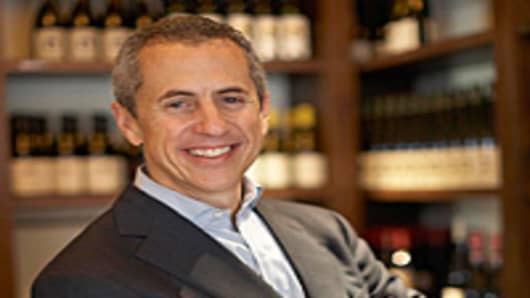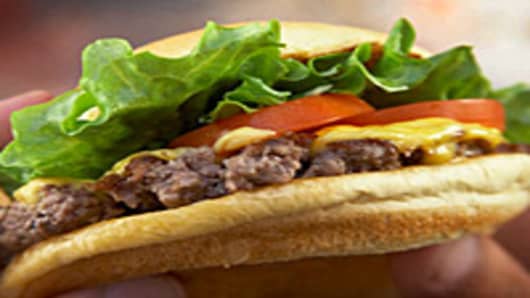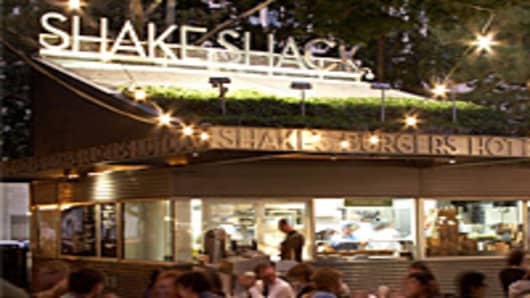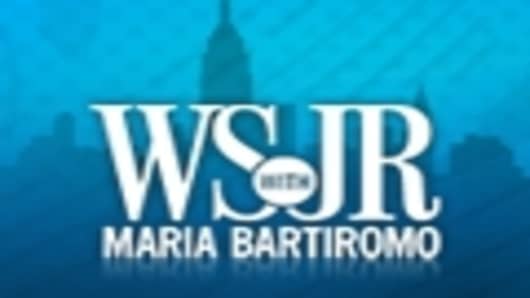Wait a minute. Or wait 60 minutes. For a hamburger. At New York's famous Shake Shack, you won’t be alone.
Known as much for its long lines as its menu — the signature ShackBurger, a 4-ounce hand-formed patty of ground Black Angus beef topped with American cheese, lettuce and plum tomato served on a grilled potato bun, the Shack-cago hot dogs piled with toppings and the eponymous milkshakes — the urban burger shack is the first food experience restaurateur Danny Meyer built into its own brand. Four new locations opened this year, including the first outside of New York City.
Burger chain Shake Shack’s signature dish perennially tops “best of” lists. Lines at the flagship location in Manhattan's Madison Square Park are so legendary that carnivores craving red meat can judge the length of the potential wait via live webcam.
A revered name in the fine dining industry, Meyer’s Union Square Hospitality Group has won 21 James Beard Awards and operates 12 restaurants, among them some of New York's most highly-regarded.
The empire began 25 years ago when Danny Meyer was a 27-year-old with less than a year of professional restaurant experience. He’d never designed a menu or administered a payroll, yet was the owner/operator of his dream iteration of a casual bistro. The simply-named Union Square Café has served classic American cuisine in a neighborhood that's transformed into a retail and residential powerhouse. Meyer's Gramercy Tavern was just rated Most Popular in the city’s annual Zagat Restaurant Survey, the sixth time since 2000. Probably his first setback is the recently announced closing of Tabla, a 283-seat Indian-themed restaurant that has succumbed to a weak economy after 12 years in business.
As consumer spending dropped in 2009 and consumers cut back on discretionary spending, like restaurant and retail sales, the diverse portfolio of Union Square Hospitality Group's assets withstood most economic hits. USHG does not discuss financial information, but its annual revenue is estimated at $70 million. Traditional comfort foods, such as at Meyer’s barbecue palace Blue Smoke and at Shake Shack, fared well in the downturn.
“In 2010, we’ve had higher revenues every single month,” Meyer says. The burger brand is a significant growth engine. Revenues for the Manhattan locations topped $4 million dollars in 2009. Estimates for average annual revenue at McDonald’s stores is just over $2 million.
More Expensive Than Typical Fast Food
A single patty ShackBurger sells for $4.75, a double $7.75. More expensive than typical fast food, but with foodie prestige, this designer take on all-American has become "an accessible opportunity to treat yourself," says Meyer. “In this economy, we’ve become a nation that aspires to the best version of anything you can find and afford — a watch, an automobile, fried chicken or a burger.”
Shake Shack's new locations range from Times Square to Miami Beach. Plans for a Washington, D.C. location near DuPont Circle, as well as franchises in the Middle East are on the menu for 2011.
Meyer admits to "looking very, very carefully" at potential spots for new Shake Shack outposts. "We want to find a community that feels just right for it." One such community is lower Manhattan's Battery Park City, a mostly-upper middle class neighborhood with a high concentration of families and a median household income of $107,406. In fall of 2011, Union Square Hospitality Group will anchor a Goldman Sachs-owned hotel space, near the financial giant's new headquarters. The three restaurants will be a Shake Shack, a Blue Smoke and a fine-dining establishment.
Beyond New York, the Shake Shack team is on the hunt for towns that have 2 or 3 potential locations "within that city to justify putting in an on-site management team," says Meyer. Union Square Hospitality Group currently employs 1,800 people.
If the appeal of the ShackBurger can travel, will the lines?
“We didn’t engineer having the line, but we did embrace it,” says Meyer, who recalls the worry he felt in 2004 when his new burger and hot dog stand couldn't accommodate the lunch rush without a significant wait. Working out of a kiosk with a 20 x 20 footprint that shared revenue with its landlord, the Madison Square Park Conservancy, Shake Shack’s flagship had barely enough room for an adequate number of grills. He did a Google search of the words “Shake Shack” and “Shake Shack + line.”
“The delta between them was about 5 percent,” he says.
Anyone who was talking about the restaurant was talking about the line. A businessman known for his belief in the power of hospitality, Meyer chose to celebrate the hot spot’s accidental identity. He equated the experience of waiting half an hour in Manhattan with his childhood memories of roadside burger stands in the Midwest. "No one is forced to stand in line. They must not hate it!”
Growing up in St. Louis, Meyer hung around the parking lots of local frozen custard favorite Ted Drewes and Steak & Shake (an owned subsidiary of Biglari Holdings).
Union Square Hospitality Group launched the online Shack Cam, and Meyer began telling stories about business meetings scheduled for the time participants would spend waiting just to order. The people-like-people approach is central to Meyer's business philosophy. He prides himself on serving great food in an atmosphere that guests — diners aren’t referred to as customers will want to repeat again and again.
"We often talk about how we want great service … we want a company to do what it says it’s going to do," he says. "That’s very different from hospitality, which is that we also want our products to make us feel good."
____________
Watch "Wall Street Journal with Maria Bartiromo" every Sunday at 7:30pm ET.






